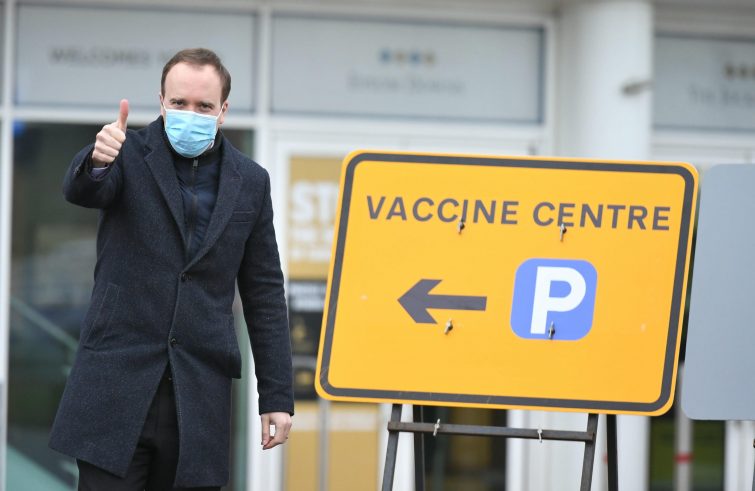
“It was the first week of January last year and, like every winter, Public Health England – the executive agency of the Department of Health – summoned us to report on a new virus, one of the many we are confronted with every year. There was nothing new, unusual or worrying about it. Dr. Chris Harvey ( in the photo), 48, acute respiratory disease specialist in one of the intensive care wards at the forefront of the fight against COVID-19, recounts the onset of ‘his’ pandemic. At Glenfield Hospital in Leicester, a town in central England, Harvey uses extracorporeal membrane oxygenation (ECMO) to save the sickest patients risking lung collapse. He recalls the past twelve months as “the most trying of my career”, when “I was working twice as many hours, sixteen a day, exhausted with sleep over evening dinner, before being sent to bed by my wife”, months when “I had to ask my patients’ relatives not to come in while their loved ones were dying.”
 When asked whether the health crisis is finally starting to be overcome in the UK, marked by an impressive drop in the number of cases, the doctor crosses the fingers of both hands for good luck and his dark eyes, above his mask, express a desperate plea that the hope he nurtures every day may come true and that the nightmare may be over. “126,284 deaths. Had I been told this one year ago, I wouldn’t have believed it,” he said. “We went from four to 30 emergency beds,” the specialist recalls. “Before COVID-19 we had one nurse for every patient. During the pandemic, there was one nurse for every four patients, assisted by whoever was available – dentists, ophthalmologists, orthopaedic surgeons, medical students, recently graduated physicians. This was made possible because all other wards were reduced to a minimum.
When asked whether the health crisis is finally starting to be overcome in the UK, marked by an impressive drop in the number of cases, the doctor crosses the fingers of both hands for good luck and his dark eyes, above his mask, express a desperate plea that the hope he nurtures every day may come true and that the nightmare may be over. “126,284 deaths. Had I been told this one year ago, I wouldn’t have believed it,” he said. “We went from four to 30 emergency beds,” the specialist recalls. “Before COVID-19 we had one nurse for every patient. During the pandemic, there was one nurse for every four patients, assisted by whoever was available – dentists, ophthalmologists, orthopaedic surgeons, medical students, recently graduated physicians. This was made possible because all other wards were reduced to a minimum.
What has been the most difficult ordeal of the past months?
“Beds are tight. Beds are tight.” This phrase, this pressure, stayed with me for months. To know that a patient with no chance of recovery was occupying the bed of another patient with a better prospect of recovery, and having to let that person die. Not being able to be near family members on their difficult journey. Having to keep them out of the hospital. Indeed, all communication had been entrusted to a group of retired doctors. Misunderstandings were a possibility. Not being able to save patients who, in ordinary circumstances, I would have managed to save. Before the pandemic we admitted anyone between 50 and 60 years old. Older patients would not respond to our treatment. With COVID we decided we had to say no to people over 50 because their chances of survival were minimal. Before the pandemic we accepted up to three patients from other hospitals every week. At the peak of the pandemic there were fifteen or twenty requests a day and we could only treat one or two. It was hard, very taxing.
 What gave you the strength to carry on?
What gave you the strength to carry on?
The strong bond with my colleagues. I knew there was always someone I could talk to, share my concerns and come to a decision together. There were also some good moments. I remember one. We were treating a very ill patient, he risked dying. Two weeks before Christmas, on a Sunday, we decided to allow him to meet his children, who were just two years and six months old, for the last time, outdoors, outside the hospital. His wife and brother and sister also arrived. His face, that until that moment had been pale, lifeless, regained vitality after he had seen his loved ones again. He found a reason to live. From then on, he improved continuously, until we discharged him from hospital.
Did you work more hours this year?
Twice as many. I usually start at 8.30am and leave at 4.30pm and then I am available for telephone consultations. During the pandemic I worked almost 16 straight hours and I had to be present in hospital for what was a mentally and physically demanding job. There was a shortage of nurses and we had to move the patients from their beds to the stretchers for their CT scans. I would come home at 10 p.m. exhausted, to start again the following morning at 6 a.m.
 In your opinion, what mistakes has the British government made in its response to the pandemic?
In your opinion, what mistakes has the British government made in its response to the pandemic?
Relaxation of coronavirus rules during the Christmas holidays was stupid. It caused the second wave of Covid, which was even worse than the first. And also back in November, during the second lockdown, not imposing tier 4 restrictions in London. It was supposedly done to protect the economy, but it was certainly a mistake. Moreover, regulations were unclear from the start and people disregarded the rules. That’s the risk we are running even now. The mere thought that we could do without masks, distancing and hand sanitizer would be a disaster.











